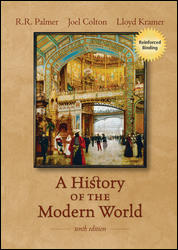
History of the Modern World, 10th Edition (Palmer)Chapter 1: The Rise of EuropeChapter OverviewIn order to understand the history of the modern world, we must not only examine Europe and its rise to ascendancy, but also the influences of other cultures and civilizations upon Europe. Convention dictates that modern times began around 1500, yet ancient civilizations like the Greeks and Romans exercised tremendous influence on what would become Europe through contributions to philosophy, science, law, and government. The spread of Christianity, which began in the Roman Empire and continued into the early Middle Ages with the conversion of barbarian tribes and the peoples of eastern Europe, gave Europe a common religion. The growth of the church and the increasing power of the papacy laid the groundwork for an ongoing struggle between secular and religious power. In the Early Middle Ages, Europe underwent social, economic, and political transformations as agricultural innovations encouraged population growth, towns and commerce flourished, and feudal relations laid the foundations for the growth of national monarchies. By about the year 1300, Europe had become a recognizable geographic, cultural, and political entity among the Mediterranean civilizations into which the Greco-Roman world had divided. |  |















